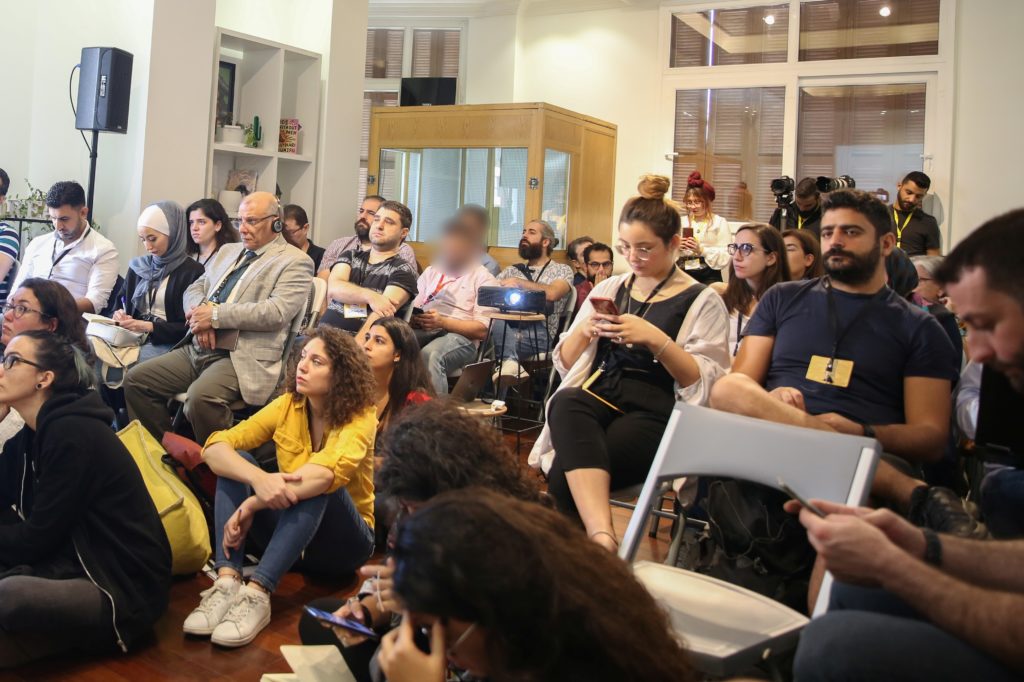From November 15 to 17, more than 250 participants gathered for Bread&Net 2019 in the heart of Beirut. With the ongoing Lebanese revolution, this was a special year for our regional digital rights unconference. The political situation was a major focus, from a topic of discussion during various panels to the session venues being named after famous public squares in Lebanon.
Supported by the event’s code of conduct, the atmosphere was friendly and casual, yet safe at all times. Participants, who represented diverse backgrounds and countries, presented and participated in sessions around five themes: Policy and Advocacy in Difficult Contexts, Digital Security Education and Practice, Communities and Networks, Cultural and Knowledge Production Online, and Autonomous Alternatives. You can find a recap of some of the issues discussed below:
An attack on freedom of expression online

There has been an increase in the arrest and prosecution of people for exercising speech online in Lebanon, where it’s common for authorities to rely on laws that criminalize libel, slander and defamation to silence speech about the country’s fragile economic situation and corruption. In one of the Bread&Net sessions, Human Rights Watch released a report about freedom of expression violations in Lebanon from 2015 to 2019. They explained that these violations have been increasing at an alarming rate since the protests over waste crisis that took place in 2015. In a session about Muhal.org, SMEX’s “observatory” for freedom of expression, it was reported that the number of people facing penalties for online speech increased from 15 cases in 2017 to 38 cases in 2018 to 53 cases in 2019 so far.
Internet shutdowns in the Arab region
Internet shutdowns have become a trend during events of national interest in many Arab countries, such as protests, elections, and exams. As a result, during recent protests in Sudan, Iraq, and Yemen, citizens preferred to use “older” methods to communicate and transmit information. In Iraq, for example, protestors used SMS to send messages regarding the protests and internet blackouts to friends outside the region with the hope that they share them online.In Sudan, during the most recent protests against President al-Bashir and the Military Council, citizens used graffiti in public spaces to call for demonstrations. The situation in Yemen, however, is hampered by very slow internet connections. Citizens overcome this by combining up to 5 DSL lines to achieve better internet speeds.
Staying safe online
Online safety and security are crucial concerns, especially in light of data breaches by private companies and cyber attacks on dissidents by Arab authorities. Accordingly, many sessions at Bread&Net tackled these issues, often providing participants with both basic and advanced tips on how to protect themselves online. Abir Ghattas, an information security technologist at Human Rights Watch, advised: ‘Update everything and then restart! You have to update to make sure you have the latest security features, and then restart to kill all the malware.” SMEX’s Ali Sibai went on to recommend password managers, such as open source app, Bitwarden, to create strong passwords and store them securely. He also recommended Linux to protect files from attacks.
Update your devices! (photo from SMEX)
Fake news is real!
The protests in Iraq and Lebanon highlighted the role of fake news in shaping public opinion, especially due to the high penetration rates of the internet and social media, as explained during the many sessions on misinformation at Bread&Net. Mahmoud Ghazayel, a journalist who covers the spread of fake news, said that he identified more than 150 cases of misinformation online during the Lebanese protests: “40% of the news investigated were completely fabricated, 24% were old content, 19% were from well-known sources, and 7% was content from outside Lebanon.” Most speakers insisted on fact-checking before sharing: this includes obtaining news directly from its source, searching for original images and videos to verify where they were first published, and never trusting the authenticity of voice notes.
Tweet Digital Rights
As part of our competition organized in partnership with Twitter, SMEX invited Spotlight from Iraq to attend Bread&Net and discuss their experience and efforts to win the competition. “We tried to identify in the real world the digital rights and online safety problems that users do not know, especially by conducting focus groups with students and artists,” said Spotlight’s Shnow al-Dawdy. The team was one of 11 teams who participated in the competition, which focused on creating original Arabic content about three topics: freedom of expression online, internet shutdown, and privacy and online safety. The Iraqi team were able to create and design tips on safety using graphs, polls, and threads. Despite the internet shutdown in their country, they worked constantly to produce and share content. Congratulations to Spotlight!!
Surrounding discussions

We also organized events and activities around official Bread&Net sessions. On November 14, Day Zero, SMEX organized a workshop, in collaboration with 7iber, an independent online media outlet from Jordan, and Afte (Association of freedom of thought and expression) from Egypt. The workshop opened a discussion between legal professionals and techies to resolve concerns about the relationship between law and technology. Additionally, one of the self-organized sessions during Bread&Net discussed the formation of groups during the Lebanese revolution, and how they can improve their organization and communication.
Hosted by SMEX, in collaboration with our supporters and partners, Bread&Net was a community-built event that created an offline space for discussion about technology, society, and human rights.
We hope to see you again at Bread&Net 2020!



